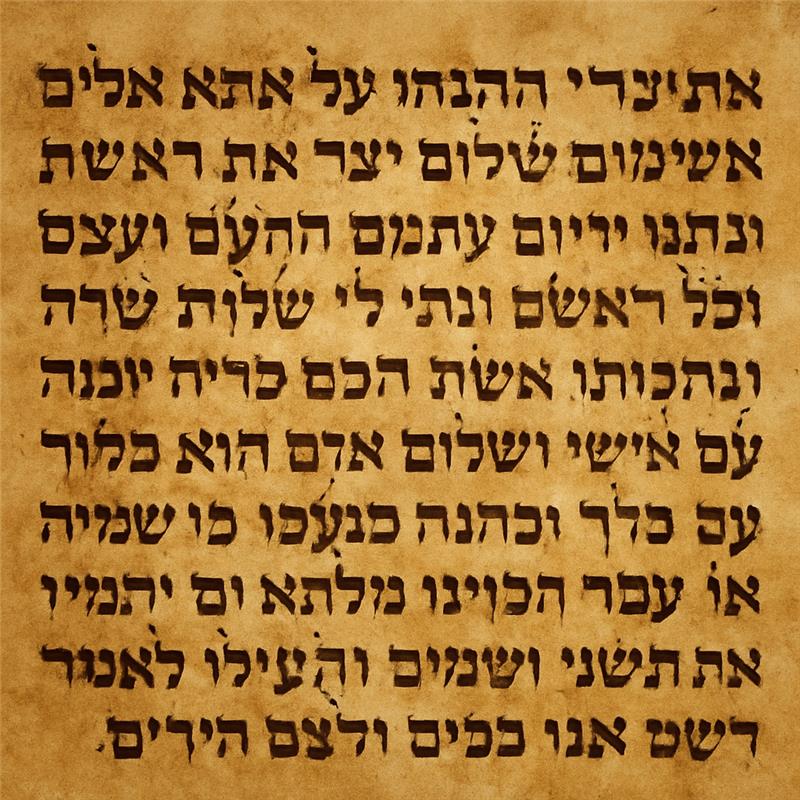Home » About Rabbi Meir » Rabbi meir biography » The Wicked Neighbors: Transformative Prayer Based on Beruriah’s Wisdom
How to Pray for Your Enemies:
The Transformative Prayer
of Rabbi Meir
Learn the Beruriah story that teaches transformative prayer can change even the hardest hearts
When dangerous neighbors made Rabbi Meir Baal Haness’s life difficult, he prayed for Divine intervention. His wife Beruriah, the brilliant Torah scholar, offered him a deeper understanding of how to pray for your enemies that would reshape Jewish thinking forever. This famous Beruriah story from Tractate Berachot 10a teaches us the transformative power of how prayer changes things and can turn those who harm us into those who help us.
Rabbi Meir Baal Haness, known throughout history as the miracle worker who promised to intercede for anyone who gives charity in his name, received profound wisdom from his wife about the power of prayer to change things. This lesson from nearly 2,000 years ago continues to guide people struggling with how to deal with difficult people Judaism style – through prayer that seeks transformation, not destruction.
The Beruriah Story That Changed Everything
The Babylonian Talmud (Berachos 10a) tells us about troublemakers who lived near Rabbi Meir and caused him great distress. Rabbi Meir, in his anguish, prayed that Divine justice would remove these harmful people from the world. But Beruriah, recognized as the only woman in the Talmud whose halachic opinions carry weight, shared a transformative insight with her husband. She asked Rabbi Meir: “What is your source? Is it because Psalms 104:35 states ‘Let sins cease from the earth’?” Then she revealed her interpretation: “Does it say חוטאים (chot’im – sinners)? No! It says חטאים (chata’im – sins)! Furthermore, look at the end of the verse: ‘and let the wicked be no more.’ When sins cease, the wicked automatically cease to exist as wicked – they become righteous.”
Rabbi Meir accepted his wife’s wisdom and changed his approach. The Talmud records: “He prayed for mercy upon them, and they repented.” This demonstrates how prayer changes hearts when aligned with Divine will, which always prefers repentance over punishment.
Understanding Prayer for Enemies to Repent
The Jewish approach to prayer for enemies to repent recognizes that every person contains a Divine spark. When we pray for someone who harms us, we appeal to that hidden goodness within them. The Hebrew word “tefilah” (prayer) comes from the reflexive verb “lehitpallel,” teaching us that prayer transforms the one who prays as much as its subject.
Jewish prayer for forgiveness operates on multiple levels. We don’t excuse harmful behavior or leave ourselves vulnerable. Instead, we distinguish between the person and their actions, maintaining hope for human transformation while protecting ourselves. This sophisticated approach allows us to guard against harm while avoiding the spiritual damage of harboring hatred.
The concept of “teshuvah” (return/repentance) is central here. Unlike punishment-focused approaches, teshuvah means returning to one’s true nature. When we pray for enemies to do teshuvah, we’re asking God to help them rediscover their essential goodness buried beneath harmful behaviors.
The Bedtime Prayer That Changes Hearts
"רִבּוֹנוֹ שֶׁל עוֹלָם, הֲרֵינִי מוֹחֵל לְכָל מִי שֶׁהִכְעִיס וְהִקְנִיט אוֹתִי"
(Master of the Universe, I hereby forgive anyone who angered or hurt me).
This ancient practice of transformative prayer prevents anger from hardening into hatred. When combined with giving tzedakah through Rabbi Meir Baal Haness Charities, this prayer changes things in powerful ways.
The Transformative Power of Prayer in Jewish Tradition
The transformative power of prayer stands as a fundamental principle throughout Jewish tradition. The Talmud (Yevamot 64b) explicitly states that prayer possesses the ability to change Divine decrees themselves, while the Zohar illuminates how prayer first affects the spiritual realms before manifesting in our physical world. This understanding forms the foundation for why Rabbi Meir’s shift in prayer approach brought about genuine transformation—not merely spiritual theory, but observable change in the material world.
Our sages provide extensive testimony to prayer’s concrete effects through multiple teachings in the Gemara. In Brachos 32b, Rabbi Elazar elevates prayer above both good deeds and sacrifices, establishing its supreme position among spiritual practices. The discussion in Rosh Hashanah 16b offers even more specific guidance, with Rabbi Yitzchak teaching that four distinct actions can tear up evil decrees: charity (tzedakah), crying out in prayer (tzedakah), changing one’s name, and changing one’s actions. Genesis Rabbah 44:12-13 echoes these themes, with Rabbi Huna adding that righteousness and repentance join prayer in nullifying harsh judgments.
Praying for Those Who Persecute You: Applying Talmudic Wisdom
The Talmud (Bava Metzia 32b) teaches that if both your friend and enemy need help, in order to overcome your evil inclination, you should help your enemy first. Applying this counterintuitive approach to praying for those who persecute you also helps one strengthen themselves spiritually while potentially inspiring change in others.
The bedtime Shema includes this forgiveness formula (found in many siddurim):
“רִבּוֹנוֹ שֶׁל עוֹלָם, הֲרֵינִי מוֹחֵל לְכָל מִי שֶׁהִכְעִיס וְהִקְנִיט אוֹתִי אוֹ שֶׁחָטָא כְנֶגְדִּי בֵּין בְּגוּפִי בֵּין בְּמָמוֹנִי” (Master of the Universe, I hereby forgive anyone who angered or antagonized me or sinned against me, whether against my body or my property). This nightly practice keeps our hearts open to reconciliation.
Forgiveness in Judaism doesn’t mean becoming a doormat. The Rambam (Hilchot Teshuvah 2:9-10) explains that we forgive those who genuinely repent and make amends, but we’re not required to remain vulnerable to continued harm. We protect ourselves while praying for the harmful person’s transformation
How to Deal with Difficult People - Judaism's Practical Approach
Jewish sources provide clear guidance on how to deal with difficult people Judaism style. Pirkei Avot 4:1 states: “אֵיזֶהוּ גִבּוֹר? הַכּוֹבֵשׁ אֶת יִצְרוֹ” (Who is mighty? One who conquers their evil inclination). Avot D’Rabbi Natan (Chapter 23) expands this: “Who is the mightiest of the mighty? One who makes an enemy into a friend.”
This three-part approach keeps you safe while allowing for miracles:
Step 1
Step 2
Step 3
Activate the Power of Transformative Prayer
Prayer Changes Hearts - The Mystical Understanding
Kabbalistic sources explain why prayer changes hearts so effectively. The Zohar teaches that all souls are interconnected through spiritual channels. When we pray for someone, even an enemy, we send positive spiritual energy through these channels. The person may not consciously know we’re praying for them, but their soul receives this influence.
The concept of “teshuvah” as return rather than repentance is crucial. According to Chassidic thought, the soul’s essence remains pure despite external actions. Sin is compared to dirt on a diamond – the diamond’s value remains unchanged. Jewish prayer for forgiveness helps remove the spiritual dirt, revealing the soul’s inherent light.
Beruriah lived this wisdom. As the daughter of a martyr and wife of a sage during Roman persecution, she had every reason to embrace hatred. Instead, she chose the path of transformation, teaching that hate only breeds more hate while prayer can break these cycles.
Modern Applications of Ancient Wisdom
Today, with rising antisemitism worldwide, Beruriah’s teaching about transformative prayer remains urgently relevant. Learning to pray for your enemies doesn’t mean ignoring real threats – it means adding a spiritual dimension to our response. When facing hatred and prejudice, Jewish communities balance necessary security measures with spiritual responses. Rather than meeting hate with hate, many communities organize prayer gatherings asking for Divine help in healing the misconceptions and wounds that fuel prejudice.
The approach of praying for those who persecute you doesn’t mean ignoring real threats. It means adding a spiritual dimension to practical responses. When we pray for those consumed by hatred to find healing and truth, we participate in tikkun olam (repairing the world) while protecting ourselves and our communities.
While each situation is unique, the pattern of transformation through transformative prayer and tzedakah appears consistently across generations. By praying for enemies while giving charity, we activate spiritual forces that can change even seemingly impossible situations.
Transform Lives Through Rabbi Meir's Merit
For over 200 years, Rabbi Meir Baal Haness Charities has connected Jews worldwide with the transformative power of charity in Rabbi Meir’s name. Founded in 1799, our organization continues the sacred tradition of supporting Torah families, widows, and orphans in Eretz Yisroel. When you give tzedakah through our charity, you invoke Rabbi Meir’s ancient promise to intercede in Heaven for all who give charity in his memory.
Your donation does more than provide material support – it creates spiritual transformation. Just as Rabbi Meir learned from Beruriah to pray for his enemies’ repentance rather than their destruction, your charity can transform challenging situations into blessings. Thousands have experienced how giving in Rabbi Meir’s merit opens doors to unexpected solutions, reconciliations, and miracles. Join this sacred tradition today.
Transform Your Enemies Through Sacred Charity
In the merit of Rabbi Meir Baal Haness, who prayed for enemies with compassion, may those who oppose you discover their errors and return to righteousness. May your charity create miracles of transformation in your relationships.
Your Questions About Transformative Prayer Answered
Why shouldn't we pray for bad people to be punished?
The Talmud (Berachot 10a) records Beruriah’s teaching that we should pray for sins (חטאים) to cease, not for sinners (חוטאים) to die. She based this on careful reading of Psalms 104:35. Every person retains their Divine image and capacity for teshuvah. When we pray for transformation rather than destruction, we align with Divine will, which the Talmud says prefers repentance over punishment.
Does prayer really change things or is it just psychological?
Jewish sources affirm that prayer creates real change. The Talmud (Berachot 10a) records that when Rabbi Meir changed his prayer, his enemies actually repented. The Zohar explains that prayer affects spiritual realms which then manifest physically. The thousands of testimonies collected by Rabbi Meir Baal Haness Charities over two centuries demonstrate prayer’s practical efficacy when combined with charitable giving.
How should I pray for someone who keeps hurting me?
First, protect yourself – the Torah commands us to guard our wellbeing (Deuteronomy 4:15). Then, use the bedtime Shema forgiveness prayer nightly. For specific situations, pray: “Master of the Universe, please heal whatever pain causes this person to act harmfully. Help them recognize truth and return to righteousness.” Remember, forgiving doesn’t mean trusting them again – it means freeing yourself from carrying anger.
What's the Jewish approach to dealing with enemies and difficult people?
The Talmud (Bava Metzia 32b) teaches to help an enemy before a friend to overcome our evil inclination. Pirkei Avot defines true strength as conquering anger and making enemies into friends. Protect yourself from harm, don’t seek revenge (Leviticus 19:18), and pray for transformation. This balanced approach guards your safety while leaving room for miracles.
How does charity connect to prayer for transformation?
The Talmud teaches that charity and prayer work together like body and soul. When you give charity while praying, you demonstrate sincerity through action. Rabbi Meir Baal Haness specifically promised to advocate in Heaven for those who give charity in his memory. This combination creates what the Zohar calls an “arousal from below” that triggers Divine response from above.
Learn More About Rabbi Meir's Teachings
 The Power Couple’s Children
The Power Couple’s Children
Discover how Beruriah and Rabbi Meir raised their family during persecution
 Deathbed Repentance
Deathbed Repentance
Rabbi Meir’s teachings about last-minute transformation
 Prayer Formulas
Prayer Formulas
Traditional Jewish prayers for different life challenges Post 4: Bar Kochva Generation
 Bar Kochva Generation
Bar Kochva Generation
Understanding the dangerous times when Rabbi Meir lived


